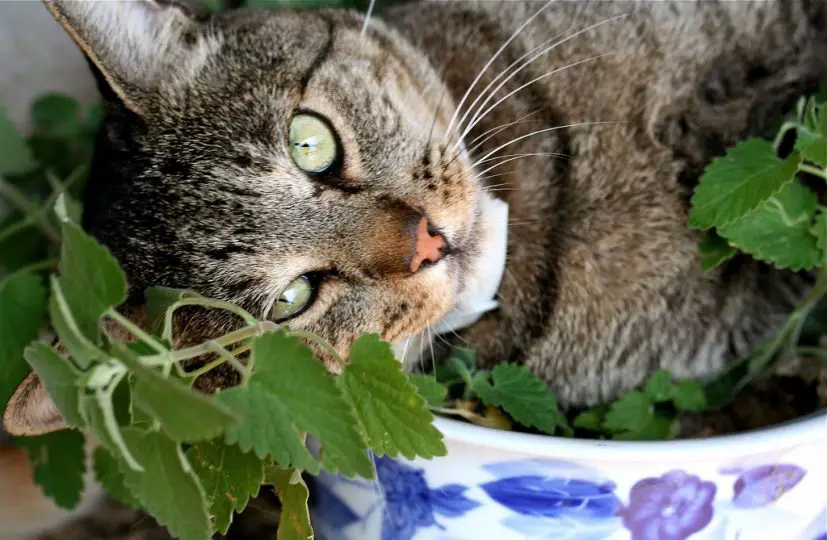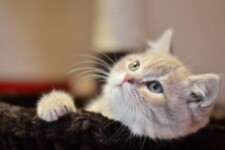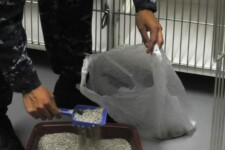Is Catnip Really Safe For Cats? (Here’s The Truth)
Cats can have cravings just like humans, and catnip is just one of those things that some cats can’t get enough of.
Catnip is a feline attractant that can turn a grumpy cat into an engaged, active, and happy cat in a very short space of time.
Owners usually get great joy from feeding their cats a bit of catnip, as they get a bit nutty and get up to some crazy funny antics while on their kitty catnip high!
Contrary to popular belief, not every cat responds the same way to catnip, and some cats just ignore it completely, being more attracted to other aromatics like lemongrass.
But the question that cat parents ask is – What does catnip do to cats, and is it safe for them to eat?
Let’s take a look at exactly what catnip is, what it does to cats, and if there are any real benefits of giving it to your cat.

Our website is reader-supported through affiliate programs. If you purchase via links on our site we may earn a small commission.
What Is Catnip?
Catnip, also referred by botanists as Nepeta Cataria, is a minty herb that originated from Europe and Asia, and is now found in parts of North America, New Zealand, Middle East, Africa and certain regions of China.
It is also known as catswort or catmint in other countries.
It grows up to 39 inches as a loosely branching plant with fragrant pink or white flowers, and is associated with mint crops, and it shares most of its characteristics with them.
Some farmers in North Calorina grow the crop for commercial purposes, and it is sold to stores due to its multiple uses among cats and humans.
Why Do Cats Love Catnip?
Catnip contains a feline attractant known as nepetalactone, a volatile oil. This oil is found in the leaves and stems of the catnip plant.
Nepetalactone also attracts even the big cats like lions and leopards in forests.
The volatile oil is believed to resemble a feline pheromone that most cats are receptive to.
Catnip Effects: What Does Catnip Do To Cats?
When you expose your cat to the nepetalactone feline attractant, the cat tends to rub its body against the catnip.
The nepetalactone molecules get absorbed into the nasal tissues, and this provides a response in the amygdala and hypothalamus.
- These two areas of the mind harbor the emotional and hormonal responses when stimulated.
The hypothalamus is responsible for regulating the psychological process of the body.
- Some of these processes may include fatigue, hunger, sleep, thirst and parental behaviors.
This area of the mind also connects the nervous system and the endocrine system.
On the other hand, the amygdala is responsible for processing emotional responses and aids in decision making.
When your cat is exposed to the nepetalactone, the signals are sent through the nose, and the amygdala integrates the signals and transmits them to the brain.
The hypothalamus receives these signals and sends neurohormones to the pituitary gland, and this leads to the release of “sex-like hormones. The cat exhibits certain behaviors that mimic a cat on heat.
- The can will roll around, jump, produce sounds, while rubbing against the plant and pawing at it.
- If your cat ingests the catnip instead of inhaling it, it can show aggression, euphoria, sleepiness, purring, meowing and drooling.
The catnip behavioral response period lasts from 10 to 15 minutes, and it is followed by a refractory period when further exposure to catnip will not have similar effects.
The refractory period lasts from 30 minutes to 2 hours. After that, the cat becomes susceptible to the catnip effects again.
What Are The Benefits Of Catnip For Cats?
Catnip has a host of benefits to cats, and most cat parents use it as a treat to reward their little feline friends.
Encourage Interactive Play
Exercises come in handy, especially when getting overweight cats to lose weight. One of the ways to lure overweight cats to exercise is by using toys that use catnip.
You can purchase interactive toys (that smell catnip) from your favorite stores. Such toys naturally lure cats to running after them around the house.
The other option is to create a small toy using safe materials like old socks and put the catnip leaves inside. This will encourage the cat to run after it to feel the enticing smell.
Food Additive
Adding a little catnip to the cat’s food can help deal with a picky eater.
The attractant helps stimulate the cat’s appetite and entice them to continue eating.
Picky eaters often fail to get the right nutrients to support their body functions and are at risk of suffering from malnutrition.
Sprinkling a pinch of catnip encourages the cat to eat and get the required nutrients to support growth, organs and improve their immunity.
Entice Cats To Drink Water
Cats do not have a natural appetite for water, and this means that you will have to get creative to entice them to drink lots of water to prevent dehydration.
Vets recommend putting a leaf of catnip in the drinking bowl and this makes the water more appealing to drink.
Find out more about cat dehydration and how to diagnose and treat it
Repel Insects
Apart from using catnip as an additive in food and water, you can also utilize the insect-repelling features of nepetalactone.
Cats and kittens often encounter various insects like mosquitoes and fleas that may causes illnesses if bites are left untreated.
You can dry the catnip leaves, crush them and rub them against the cat’s body, and this repels away common insects that attach themselves to the cat’s body.
Alternatively, if you have a kitchen garden in your home, you can plant the catnip plant and use it to repel away mosquitoes and benefit from its medicinal value on humans.
Cat Flatulence
Sometimes, cats may suffer from flatulence due to change of diets, swallowing air or eating foods with lots of gas.
Giving them catnip helps relax their stomach and reduce the tension.
It also eases stomach discomfort by pushing the air downwards to remove it from the cat’s body.
This is the reason why mothers use catnip to treat colic in babies to sooth the stomach.
Skin Conditions
Catnip is also known to relieve skin conditions and reduce skin irritations in both humans and cats, and rubbing crushed catnip on the cat’s body can ease the irritation.
Also, bathing cats in catnip tea also helps in treating skin conditions, and soothing skin irritation.
Precautions when Giving Your Cat Catnip
Catnip is completely safe for cats, but there are certain precautions that you should take to protect your cat.
First, cats that have been exposed to catnip tend to be “high” and may be unaware of their surroundings.
If you live in crowded neighborhoods, busy roads or streets, you should monitor your cat to make sure she doesn’t wander off your sight.
Cats exposed to danger may be unable to take quick action when they are “feeling high”.
You should also keep harmful substances away from the cat’s view since they can drink or eat human foods that are poisonous to cats.
Secondly, you should give catnip in moderation. Some cat parents have reported diarrhea and vomiting when their pets ingested too much catnip.
Some cats are able to measure their capabilities, and will likely walk away after having enough of the stimulant.
Don’t give much catnip to your cat if you are not there to monitor how much of the plant they will eat.
FAQs About Catnip for Cats
Is catnip safe for my cat?
Catnip is safe for cats to inhale and ingest.
However, you should monitor your cat to prevent her from overdosing, which may cause vomiting and diarrhea, after which everything will go back to normal.
How much of catnip is enough?
A small pinch of crushed catnip leaves should do the magic, and it is enough to give your cat that “high feeling”.
If you decide to give the cat a catnip plant, one plant or a few leaves are enough.
Make sure to keep the other plants away from her sight because she may be tempted to overdose.
Where can I buy Catnip?
Most local stores sell catnip toys or powdered catnip.
You can also get it on Amazon and have it shipped to your home in a few days.
Can humans use catnip?
Catnip has multiple uses among humans, and it used in making herbal tea, as an insect repellent, stress and anxiety relief, sooth menstrual pain, ease stomach discomfort and speed up fever recovery.
Can a pregnant cat use catnip?
Catnip should NOT be given to pregnant cats since it causes uterine contractions, and the cat may give birth prematurely.
More Reading
Sources
https://www.missouribotanicalgarden.org/PlantFinder/PlantFinderDetails.aspx?kempercode=e433
https://www.thoughtco.com/nepetalactone-chemistry-of-catnip-608397







